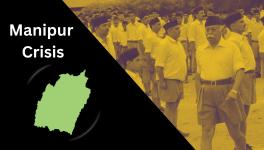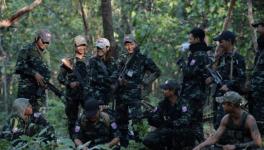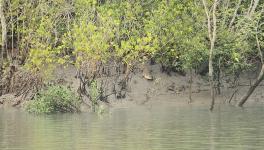‘Stand with Myanmar’: International Solidarity Campaign to be Held against Military Violence
In Myanmar, the Burmese military unexpectedly and illegally invaded the country in February. Myanmar’s the then state counsellor Aung San Suu Kyi, and other political leaders have been under arrest since then. Following the coup, Burmese military has been cracking down on Myanmar’s people for more than a hundred days in a bid to quell a non-violent uprising against the army. More than 3,000 social activists, political activists, journalists, women leaders, and youth activists have been illegally imprisoned.
As international attention on the situation in Myanmar continues to grow, a human rights campaign called ‘Stand With Myanmar’ is being launched by multiple institutions, organisations, and forums globally on June 5, which is World Environment Day.
An international solidarity is a pressing need given the East Asian country’s situation post the February coup. One student told Radio Free Asia that “Students have been arrested, imprisoned, and unjustly shot during the protests,” adding that, “Out of respect for those killed and tortured, we won’t go to school until the uprising is over.” Many students, teachers, and young people form a large part of the 3,936 people currently in detention, the 788 killed due to the coup, and the astounding 1,619 arrest warrants issued.
In the face of the crackdown, the locals are desperately taking shelter in the forests. Here too, military attacks are being carried out on civilians. The police and the army have been firing indiscriminately on protesting civilians daily since the military took over on February 1. According to daily reports, 400 to 700 people are being killed in the indiscriminate firing. Women and children are brutally physically and sexually assaulted. The army is forcibly breaking into the homes of civilians, damaging their property, and looting the valuables in the houses. The army is also reportedly sexually harassing, raping, and beating women in their homes.
In May, the military shut down Myanmar’s telecommunication service. In this fiery environment, the citizens of Myanmar and their struggle for their rights are being fought in three forms -- the first is against the illegal attack by the army; the second is defending themselves from the Covid-19 pandemic and the lack of basic amenities like food, clothing, shelter, and to top it all, they have to live under military terror again. The third is the ongoing struggle of the local indigenous population in the state of Karen for the last several years to prevent the destruction of the country’s natural resources in the name of development.
The Karen conflict is an armed conflict in Karen State of Myanmar. The conflict has been described as one of the world's "longest running civil wars". Karen nationalists have been fighting for an independent state known as Kawthoolei since 1949. In the 72-year long conflict, there have been many different combatants, the most influential of which are the Karen National Union and their Karen National Liberation Army (KNLA); on the other hand, there is the Tatmadaw, which is the armed forces of Myanmar. Hundreds of thousands of civilians have been displaced throughout the course of this conflict.
The Karen (Salween) River is located at Day Pu Noh in Mutraw District of Karen State. Alongside, there is also Salween Peace Park. The indigenous people living here are the original inhabitants of this place. A large number of these tribes have been living by the riverside for years. Their livelihood depends on forest products and medicines from the forests around Karen River. But in the last few years, there have been moves to build a big dam in this area. The locals are being forcibly evicted to build the dam. Attempts are being made to expel those who are living there and force them to move to refugee camps. The indigenous people of this area are living as refugees in their motherland.
Karen River Watch has been working in the area around the river for many years to protect the rights of citizens. Saw Tha Phoe, co-ordinator of Karen River Watch and Karen Environment and Social Action Network, said that on March 27, the Burmese army carried out airstrikes at the Salween Peace Park in De Bu Noh in the Mutraw district to demonstrate its military might. Helicopters and drones patrolled the area around 3.30 pm on the same day. Between 6:30 pm and midnight, two Burmese military fighter jets dropped nine bombs on the site, and gunshots were fired from the plane. The attack killed three villagers, seriously injured seven, and damaged several houses. The Burmese troops did not stop there. On the next day, around 10 am on March 28, Burmese forces launched another airstrike on the Ta Ka To Ba Baw village, 12 miles north west of De Bu Noh village. At about three in the afternoon on the same day, four fighter jets flew over the town of De Bu Noh and then headed for the Salween River, which flows along the Thai-Burma border. These fighter jets have also carried out airstrikes on some villages along the Salween River, including Ma Nu Hatta and The Ka Ka Hta.
As a result of these attacks, civilians are fleeing to the forest to save their lives. Citizens from villages such as Maye Nu Hatta, U Weh Chlo, and I Tu Hta IDP camps and people from the banks of the Salween River, are trying to cross the river to seek refuge in Thailand. In this, too, they are being stopped by the Thai soldiers.
It is becoming increasingly difficult to confirm the exact number of dead among the IDPs (internally displaced persons) or refugees as telephone services and power supply were disrupted due to the Burmese airstrikes. According to local news and community organisations, an estimated 2,500-3,000 people woud seek refuge in Thailand. The army had been firing on Karen village for several months before the airstrikes, causing thousands of people to flee. The situation is further exacerbated by ongoing attacks, more casualties and displacement in the wake of the recent airstrikes.
On March 29, Karen River Watch and Karen Environment and Social Action Network issued a statement calling on all human rights organisations, the friendly countries, the United Nations, and various UN organisations to stand against attacks on civilians by the Burmese military, as well as repression and human rights abuses.
“The Burmese army, which seized power by a rebel force, has taken over the country. Not only has the country been taken over, but the citizens are being brutally persecuted. Burmese soldiers have committed and continue to commit massive human rights abuses against civilians living there for generations,” the statement by the indigenous people of the Salween River basin, raising four key demands to the Burmese military and concerned national and international groups.
The first of their demands is for the Burmese army to stop airstrikes and human rights violations along with removal of military camps from their ‘ancestral lands’. Secondly, they demanded immediate assistance for forcibly displaced villagers. Thirdly, they urged the dictators of the Burmese military to return control of the country to the people for a federal democracy that “guarantees equality and full self-determination for all ethnic groups.” Further, they called for international action to stop the army atrocities and raised the fourth demand by asking the International Criminal Court to send a monitoring body to Burma to bring the situation under control. They also demanded a UN Security Council resolution calling for a global arms embargo on Burma.
To put a stop to their suffering, the indigenous people’s group from Karen said in their statement that they would be supporting the human rights campaign called ‘Stand With Myanmar’. The two groups will support the campaign on behalf of the Asia Pacific Environment Defender Network.
(The author of this article is member of Asia Pacific Network of Environment Defender .)
Get the latest reports & analysis with people's perspective on Protests, movements & deep analytical videos, discussions of the current affairs in your Telegram app. Subscribe to NewsClick's Telegram channel & get Real-Time updates on stories, as they get published on our website.
























